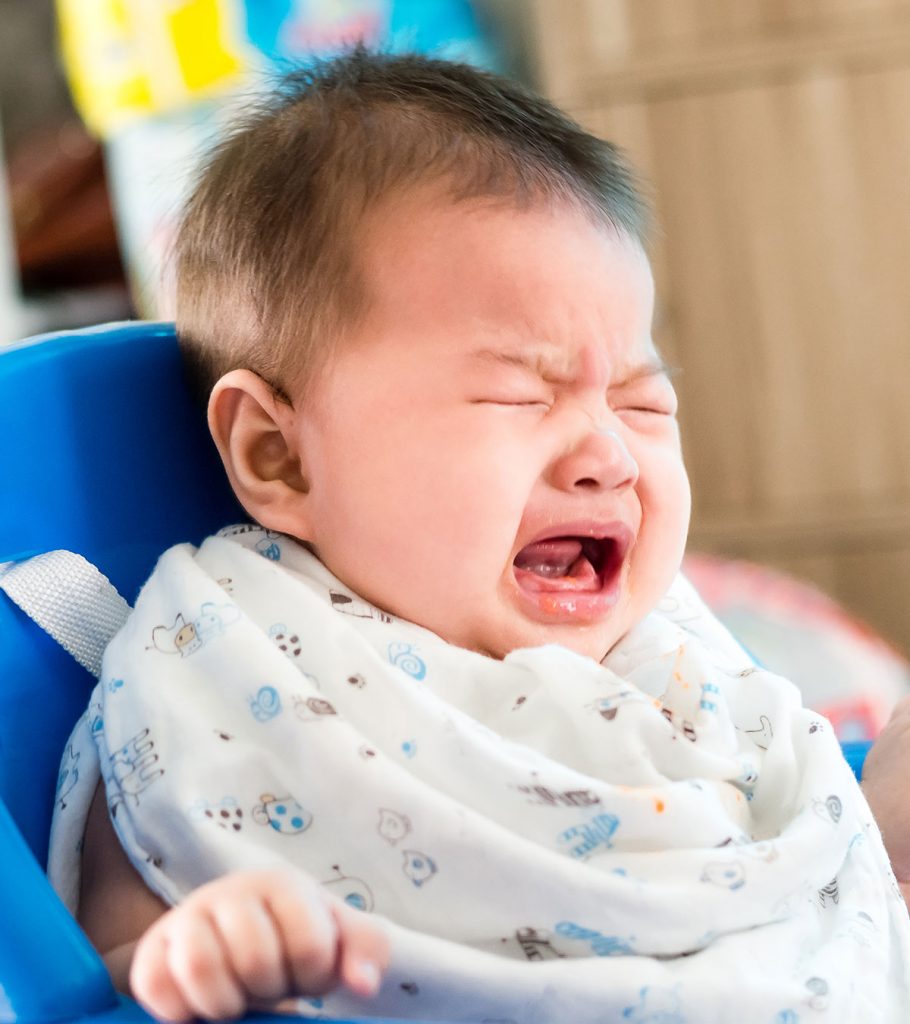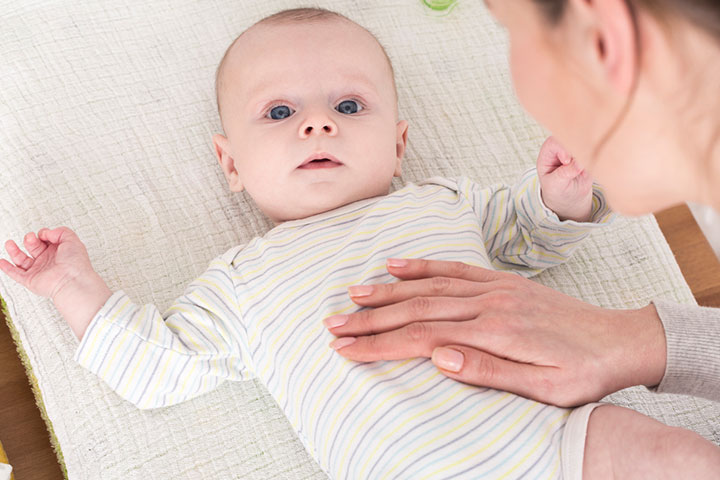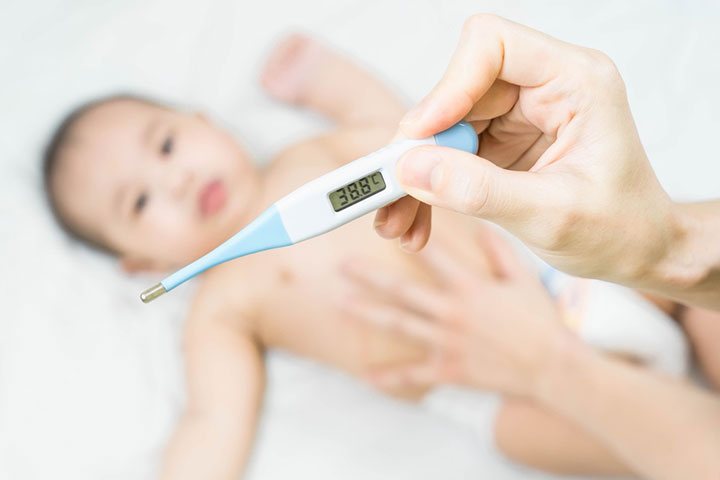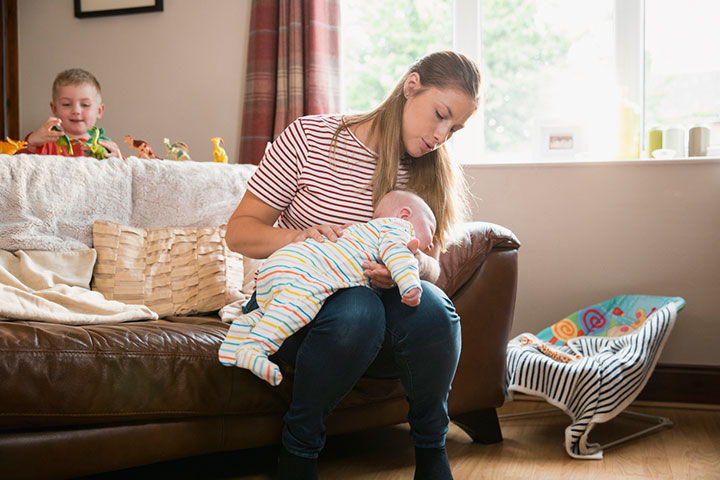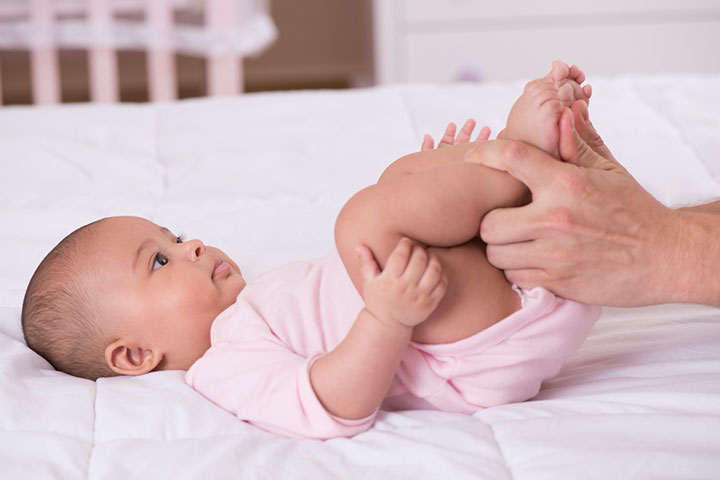Hunger is among the main reasons babies cry. However, it may be confusing for parents when a baby cries after feeding. In such a situation, mothers may develop doubts about whether the milk is insufficient, the formula is suitable, or the baby is unwell.
These questions can lead to worry and fear in new mothers. To answer these questions, read this post, where we discuss the reasons a baby might cry even after feeding them, what to do in such a situation, when to consult a doctor, and tips to prevent this from happening.
Why Does A Baby Cry After Feeding?
There is no single reason why a baby may cry right after a feed. If your baby cries after feeding, it does not always indicate underlying pathologyiXThe study of the causes and effects of a disease or an injury by examining tissues, organs, or fluids. Read on to know more about the non-pathological and pathological causes that may make a baby cry after feeding: The following are the most likely reasons.
1. Non-pathological causes
- Colic: The condition is defined as ‘three hours of crying for at least three days a week in an infant under three months of age (1). The exact cause of colic is unknown. Colic can be due to any of the several underlying reasons, including gas. Colicky babies may start crying abruptly after a feed. Babies with colic usually cry during a particular time in the day and cry at the same time every day.
- Gas: Excessive gas in the stomach can cause stomach discomfort leading to crying after each feed. Acid refluxiXA digestive disorder in which stomach acid or bile enters the food pipe, usually after eating: Acid reflux is a common occurrence during infancy, and the condition can happen in one among five infants (2). Reflux occurs when the lower esophageal sphincteriXA group of muscles at the lower end of the esophagus that helps food travel from the mouth to the stomach (LES) does not close properly, thus allowing a few stomach contents and acid to move up to the mouth. Acid reflux does not always need medical intervention. Most times, the baby throws up after crying and then calms down. If the reflux is persistent, then it could indicate gastroesophageal reflux diseaseiXA digestive disease in which the stomach contents move up into the esophagus, causing discomfort or GERD. One of the symptoms of GERD is crying during and after feed due to the irritation caused by the regurgitated stomach acid (3).
- Teething: Teething infants may constantly have sore gums, which can hurt during a feed (4). It might make them irritable and also make them cry during and after feeding.
2. Pathological causes
- Fever: Some babies lose their appetite and cry a lot when they have a fever. A fever might indicate an underlying infection. Keep a check on the baby’s body temperature using a thermometer. Take the baby to the doctor if you observe a temperature above 39°C (102.2°F) or a baby under three months old has a temperature above 38°C (100.4°F). Babies might cry after feeding due to fever (5).
- Ear pain: Pain in the ear can make the baby very fussy and irritable. They might cry if they have pain in their ears (6).
- Intussusception: Intussusception is a condition in which part of the intestine folds into the section next to it. Babies with intussusception might cry a lot. They usually fold their knees up to their chests during the episode of pain and cry. The pediatrician will do a physical evaluation and might also advise ultrasound or CT scan to achieve a diagnosis (7).
- Nose block: If the baby’s nose is stuffed, it may interfere with feeding. The baby might feel restless and cry (8).
- Allergies and intolerance: A baby could be allergic to milk or have lactose intolerance. Allergies can cause symptoms like the development of rashes, vomiting, and upset tummy. It can cause abdominal cramps and also make the baby feel gassy and irritable (9). Infants may also be allergic to breast milk in the case of galactosemia, which is an inability to digest a form of milk sugar called galactose that is also found in breast milk (10).
Knowing how to handle the situation can be helpful if the baby tends to cry too often after every feed.
What To Do When The Baby Cries After A Feed?
If your baby begins to cry after a feed, then you can try the following remedies.
- Let the baby burp between and after feeding. Hold the infant in your arms with their head resting on your shoulder. Gently tap between their shoulder blades, which is right at the center of the upper back, until you hear a burp. Pllace a towel on your shoulder since infants normally regurgitateiXTo bring back consumed food back into the mouth or spit-up a small quantity of stomach contents along with a burp. Place a towel on your shoulder since infants normally regurgitatei or spit-up a small
- Give a break in feeding, especially in the case of infants that have acid reflux. Stop the feed for a few minutes before resuming. It can give the baby’s stomach contents some time to settle and prevent the baby from regurgitating the acid.
- Change formula if you suspect formula feeding is the culprit. Observe the baby after each feed to know if it is suiting them. Always try more than one formula for your baby and get the one that works the best.
- If your baby is teething, then give them a teething toy or an orthodontically shaped pacifier before feeding to ease the gum irritation. Use only toys that are exclusively meant for teething and not just a random object for the baby gnaw at.
- Tummy time and basic exercises are an excellent way to improve the muscular dexterityiXThe muscular strength to move or lift objects with maximal effort of the infant while also providing enough tummy pressure to allow any gas to pass through. You can also perform basic exercises like make the baby lie on their back and move their legs in a cycling motion.
Another activity is to bend their legs such that their knees touch their abdomen. These exercises have been proven to relieve the baby of gas, which can be one of the factors making them fussy and cry after a feed.
These remedies should help you prevent the baby from crying after a feed. However, it is best to see a doctor in some situations.
When To See A Doctor
Get the baby checked by a pediatrician if the baby cries after feeding and displays the following symptoms too:
- Fever
- Diarrhea and vomiting
- Abdominal bloating
- Poor height and weight gain
- Swelling of face and throat muscles
- Blood in stools
- Extreme lethargy and drowsiness
These could be the signs of some underlying health problem. Your baby’s doctor can diagnose these by assessing the symptoms and also through diagnostic testing of blood and stool.
Is There A Treatment For A Baby’s Crying After A Feed?
Yes. The treatment depends on what is causing the baby to cry after having a feed. The following are the three common means of curing the problem.
- Change in diet: Conditions like allergy and intolerance last forever. Your doctor will tell you ways to manage the condition through the use of alternative foods like soy formula and hydrolyzed milk formulaiXA type of milk in which the protein is partially or completely broken down into small pieces (11). The baby has to avoid milk and other dairy products too once they are old. Switching to another brand of formula is also a method.
- Change in feeding style: The baby may cry after a feed due to excessive ingestion of gas caused by a poor latch to the breast or bottle nipple.
Dr. Emily Spaeth, neonatal physical therapist and lactation consultant from Portland, Oregon, says, “If the latch is not deep enough, or if the muscles in the mouth and face are not strong enough, it can lead to the baby taking in the air during a feed. This, in turn, generates gas bubbles which stretch the immature digestive system and can lead to discomfort.”
A doctor or lactation expert can help you determine it and suggest the best way to feed your baby.
- Medication: Some conditions like gastroesophageal reflux (GERD) may require the infant to have medications. Medicines and the course of treatment will entirely depend on the severity of the problem.
Infants seldom need any treatment when they cry after a feed. Some home prevention methods are probably all that you need.
How To Prevent Babies From Crying After Feeding?
If the cause of the baby’s crying is an underlying health problem, then treatment will aim at treating that and preventing it in the future. But in most cases, the following steps will help prevent the baby from crying after feeding.
- Choose to breastfeed: Breastfeeding your baby instead of giving them the formula is probably the best decision for your baby’s health. Medical experts state that breastfeeding can help prevent colic and other abdominal problems that cause discomfort and make the baby cry even after feeding (12).
- Use slow flow bottle nipple: Slow flow nipples do precisely that – slow down the flow of milk into the baby’s mouth. Pediatric experts also recommend slow flow nipples over other ones as that can prevent conditions like gassiness and acid reflux, which can make a baby cry after a feed.
- Change bottle feeding methods: Use the paced bottle feeding method wherein you hold the baby vertically and place the bottle horizontally in their mouth. You tilt the bottle gently, letting the baby suck the milk. A few minutes later, you tip the bottle downwards, causing the milk to flow away from the nipple. You resume feeding only when the baby makes the sucking noises. This puts your baby in control of how much milk they drink and prevents overfeeding (13). Overfeeding can cause gassiness, abdominal discomfort, and even reflux in babies who already have gastroesophageal reflux disease. These conditions, in turn, can cause a baby to cry after a feed.
- Regular burping and exercises: Make burping and exercising your baby a part of the feeding regime to keep the crying away.
An upset stomach, colic, or teething may be the reasons why your baby cries after feeding. However, there may be deeper implications if you notice fever, allergies, or diarrhea symptoms. Make sure you burp your baby after each feed. Try giving breaks during feeds or changing the formula if the baby is fed one. Adding tummy time and a few exercises can go a long way to help improve digestion. Consult a pediatrician to get suggestions on required changes in feeding style, diet, or medications.
Key Pointers
- Gas, colic, and teething are the common non-pathological causes of baby crying after feeding.
- A baby may also cry after feeding for pathological reasons, such as fever, allergies, or earache.
- Changing the formula, helping the baby burp, or doing some exercises might help in some cases.
- Consult a doctor if your baby is crying continuously and showing worrisome signs.
